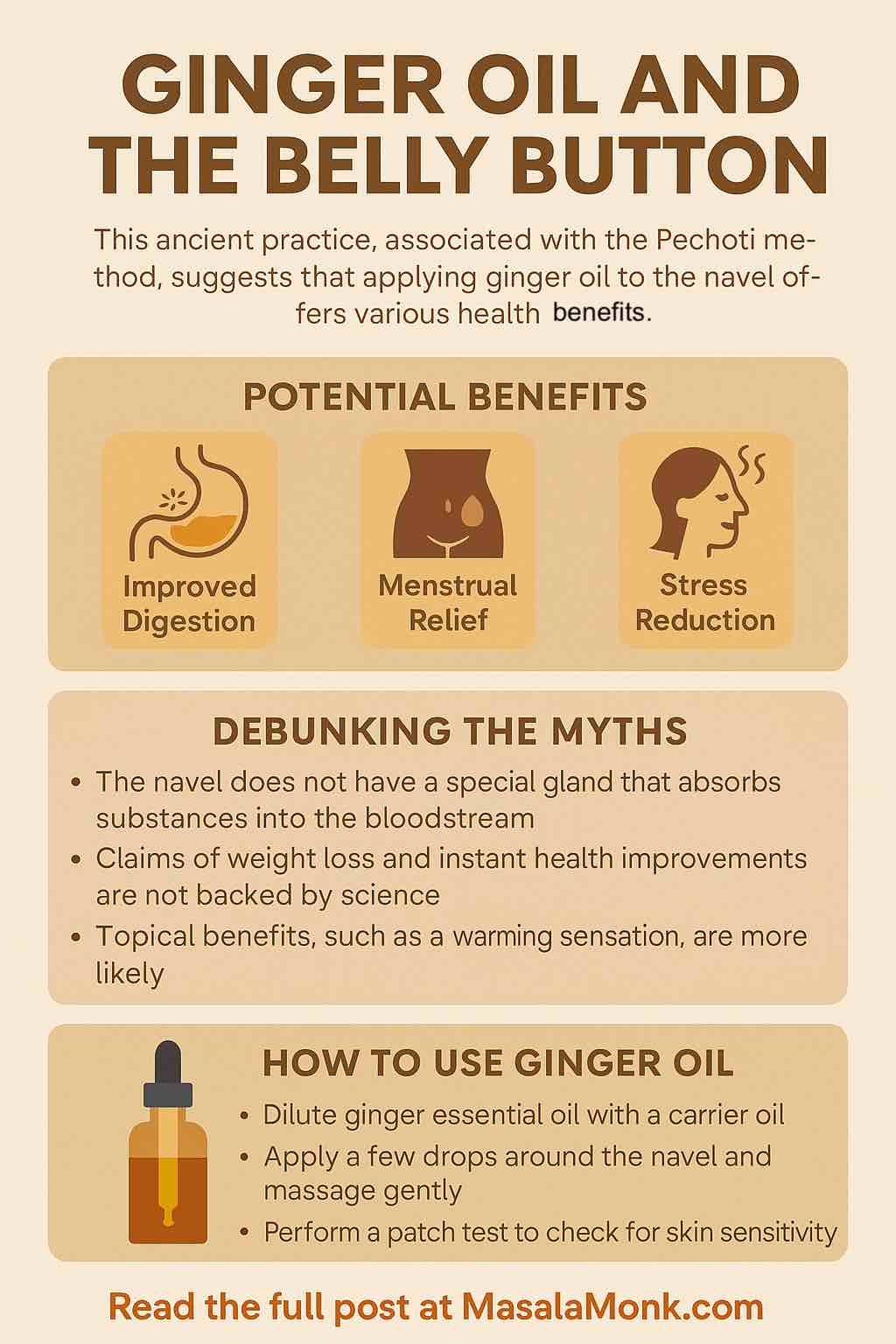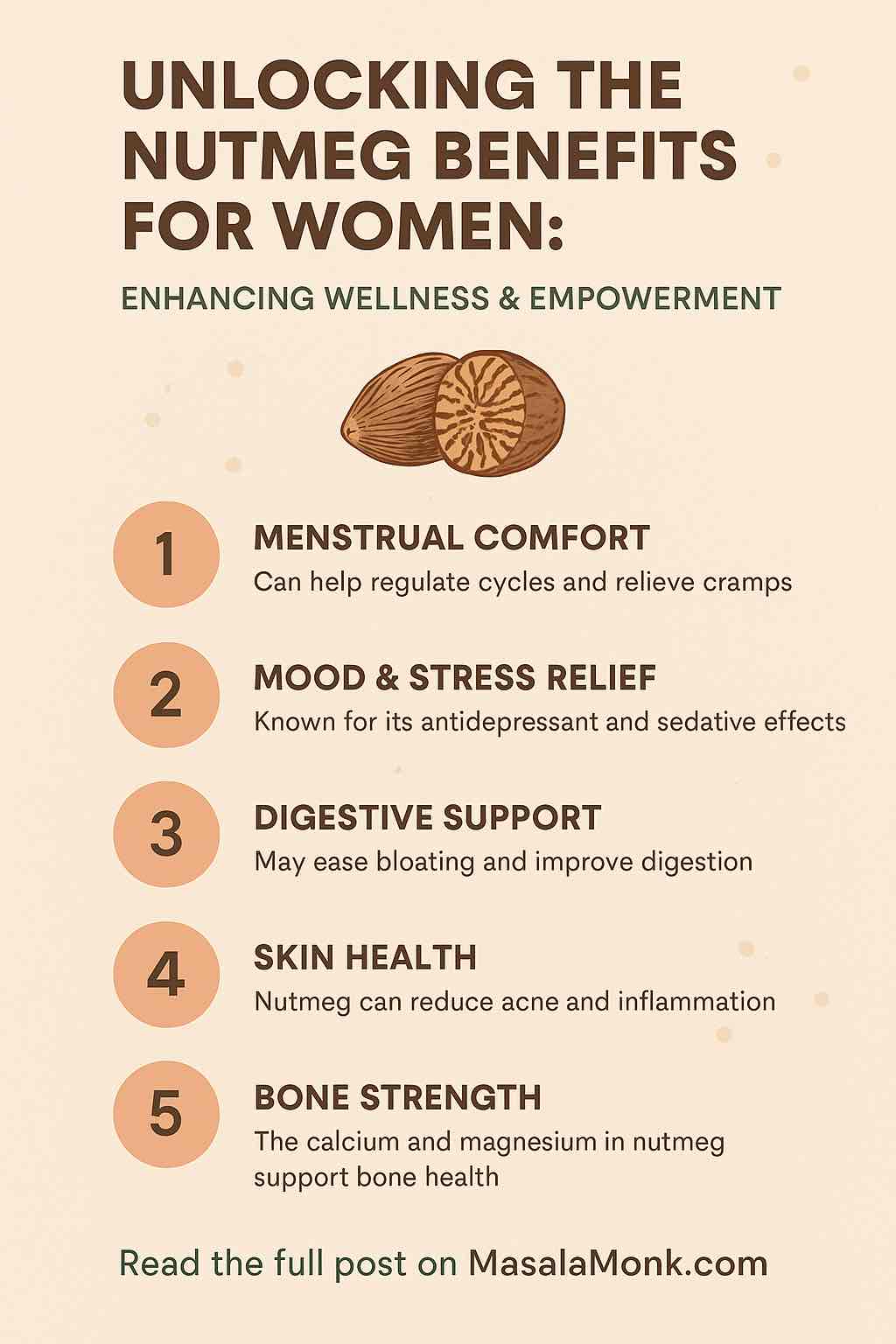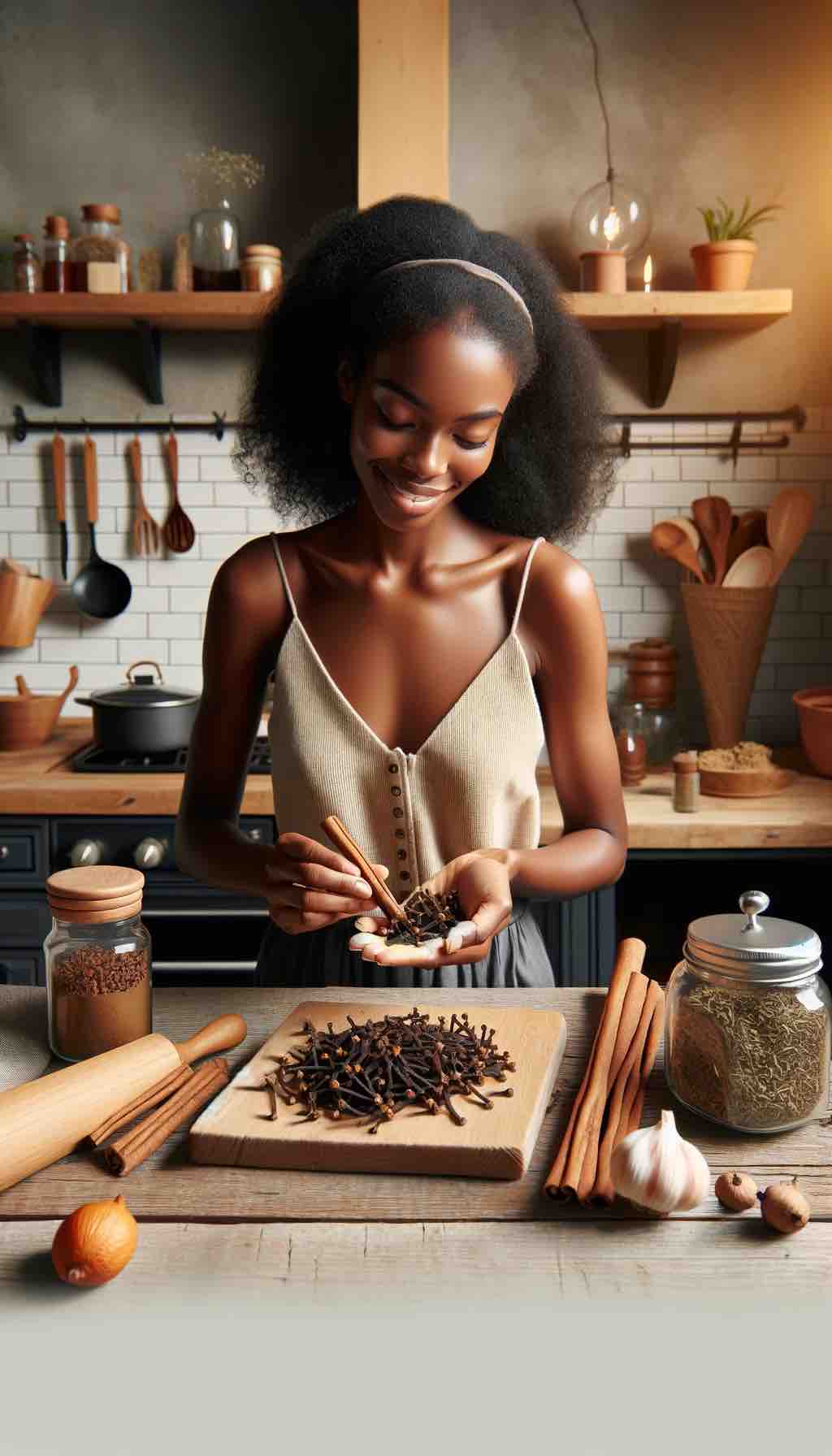
In recent years, wellness practices rooted in ancient traditions have gained significant attention. One such practice that has sparked curiosity is the application of ginger oil to the belly button, often referred to as the “Pechoti method.” This technique, believed to have its origins in Ayurvedic medicine, suggests that the navel is a central point for health and wellness, offering a gateway for oils and other substances to enter the body. But is there any truth to these claims? Can ginger oil really offer health benefits when applied to the belly button? Let’s dive deep into the science, benefits, myths, and practical guidance surrounding this unique wellness practice.
What Is the Pechoti Method?
The Pechoti method is a traditional practice rooted in Ayurveda, an ancient system of medicine from India. According to this method, the belly button is seen as a vital point in the body, a hub of energy and health. It’s believed to have direct connections to various organs and systems, and applying oils or medicinal substances here can promote overall well-being.
While this idea might sound unconventional, the theory is that the belly button serves as a “portal” to internal systems—perhaps due to the historical importance of the umbilical cord. In Ayurveda, the navel is thought to help absorb and distribute beneficial properties of essential oils to the entire body, supporting everything from digestion to hormone balance.
Ginger Oil: A Powerful Natural Remedy
Ginger oil is derived from the root of the ginger plant, which has been used for centuries for its medicinal properties. It contains powerful compounds like gingerol, shogaol, and zingiberene, known for their anti-inflammatory, antioxidant, and analgesic effects. These properties make ginger oil a popular choice for soothing muscle pain, reducing inflammation, and even alleviating nausea and digestive discomfort.
When applied topically, ginger oil can provide a warming sensation that helps to increase blood circulation in the area, which may offer localized pain relief. This makes ginger oil particularly beneficial for muscle aches, joint pain, and even conditions like indigestion.
But does the belly button really enhance these effects? Let’s explore the potential benefits of this practice in detail.
The Potential Benefits of Ginger Oil in the Belly Button
Although modern science has not fully validated the claims surrounding the Pechoti method, many users swear by the practice. Below are some of the benefits commonly attributed to applying ginger oil to the belly button:
1. Improved Digestion
One of the most common benefits reported by users is improved digestion. Ginger is well-known for its ability to ease nausea, reduce bloating, and promote healthy digestion. Applying ginger oil to the belly button might help soothe digestive discomfort by stimulating circulation and supporting the digestive organs.
In fact, some believe that the belly button’s connection to the digestive system makes it an ideal point for ginger oil to be absorbed and enhance digestive health. While there’s no scientific evidence to support this claim, anecdotal evidence suggests that many individuals experience reduced bloating and improved gut health after incorporating this practice.
2. Menstrual Relief
Many women experience discomfort during their menstrual cycle, including cramps, bloating, and fatigue. Ginger, known for its anti-inflammatory and pain-relieving properties, has been used for centuries to alleviate menstrual pain.
Applying ginger oil to the belly button may help reduce menstrual cramps and discomfort by improving blood flow to the pelvic area and reducing inflammation. Some users on platforms like Reddit and TikTok have shared their personal experiences of feeling significant relief from cramps after using ginger oil in this way.
3. Stress Relief and Relaxation
The process of applying oil to the belly button can also be incredibly calming. This practice encourages mindfulness and relaxation, and the warming sensation of ginger oil may provide comfort and stress relief. Many users report feeling more grounded and relaxed after incorporating this practice into their daily routine.
Furthermore, ginger oil’s soothing aroma can have a calming effect, helping to reduce anxiety and promote mental clarity. The navel is considered an energy center in Ayurveda, so focusing on this area may help balance and center the body’s energy.
4. Skin Health
Applying ginger oil to the belly button might also have positive effects on skin health. Ginger oil is rich in antioxidants, which help protect the skin from oxidative stress caused by free radicals. These compounds may contribute to healthier, more radiant skin.
In some cases, users report that the area around their belly button feels softer and more hydrated after using ginger oil. While this effect is largely anecdotal, it’s worth noting that regular use of diluted ginger oil might help reduce dryness or irritation in the skin.
Debunking the Myths: What Does Science Say?
While the traditional use of ginger oil in the belly button is rooted in ancient practices, modern science has not fully validated these claims. Here’s a look at some of the common myths and the scientific evidence (or lack thereof) that supports or refutes them:
1. The Belly Button as a “Magic Portal” for Absorption
One of the most significant myths associated with this practice is the idea that the belly button acts as a direct gateway for oils and substances to enter the bloodstream. The concept of a “Pechoti gland” in the belly button, responsible for absorbing substances, is not supported by scientific evidence. The skin in this area is like the skin elsewhere on the body, and it doesn’t have any special mechanisms for absorbing oils into the bloodstream.
While oils applied to the skin can be absorbed through the epidermis, this process happens gradually and is local to the area where the oil is applied. Therefore, applying ginger oil to the belly button is unlikely to have systemic effects on the body in the way that some proponents of the practice suggest.
2. Ginger Oil for Weight Loss
Another claim associated with the belly button and ginger oil is weight loss. Some wellness influencers claim that ginger oil can help reduce belly fat or boost metabolism when applied to the belly button. However, there is no scientific evidence supporting these claims.
While ginger is known to have some digestive benefits and may help reduce bloating, weight loss requires a combination of factors such as a balanced diet, regular physical activity, and overall calorie expenditure. Ginger oil alone is not a magic solution for weight loss.
3. Instant Health Benefits
Another myth is that applying ginger oil to the belly button will provide instant health benefits. While ginger oil is a powerful remedy, it’s unlikely to produce immediate, dramatic results. Many of the reported benefits, such as improved digestion or reduced cramps, are often cumulative and require regular use over time.
How to Use Ginger Oil on the Belly Button
If you’re interested in trying the Pechoti method, here’s how you can safely incorporate ginger oil into your wellness routine:
1. Dilute the Ginger Oil
Essential oils are highly concentrated and can cause skin irritation if used undiluted. Always dilute ginger essential oil with a carrier oil like coconut, jojoba, or olive oil. A general rule of thumb is to use 3-5 drops of essential oil per tablespoon of carrier oil.
2. Perform a Patch Test
Before applying ginger oil to your belly button, it’s essential to conduct a patch test. Apply a small amount of the diluted oil to a small area of your skin (such as the inside of your wrist) and wait for 24 hours to ensure there are no allergic reactions.
3. Apply to the Belly Button Area
Once you’ve diluted the oil and performed a patch test, you can apply a few drops of the oil mixture around your belly button. Gently massage the oil into your skin in a circular motion. You can also use this time for relaxation and mindfulness, as the aroma and warmth of the oil can help soothe the mind.
4. Repeat Regularly
For the best results, you should repeat this practice regularly. Many users report positive effects after consistent use, such as improved digestion, relief from cramps, and enhanced relaxation.
Conclusion
The practice of applying ginger oil to the belly button, while rooted in ancient wisdom, has become increasingly popular in modern wellness circles. While scientific evidence does not fully support the claims of the Pechoti method, anecdotal reports suggest that many people experience benefits such as improved digestion, menstrual relief, and stress reduction.
If you’re interested in trying this practice, make sure to do so safely by diluting the oil and performing a patch test. Remember, wellness is a personal journey, and what works for one person may not work for another. As with any new health practice, it’s important to listen to your body and consult a healthcare professional if you have any concerns.
Embrace the ritual with an open mind, and you may just find that the ancient practice of applying ginger oil to the belly button adds a sense of calm and balance to your daily routine.
FAQs About Ginger Oil and the Belly Button Practice
1. What is the Pechoti method?
The Pechoti method is an ancient practice, primarily from Ayurvedic traditions, that involves applying oils to the belly button. It is believed that the navel is a key energy center connected to various organs, and that oils applied to this area can be absorbed and support overall health.
2. Does applying ginger oil to the belly button really work?
While there is no scientific evidence supporting the claim that ginger oil directly enters the bloodstream through the belly button, many people report anecdotal benefits, such as improved digestion, relief from menstrual cramps, and enhanced relaxation.
3. What are the benefits of using ginger oil on the belly button?
Common benefits reported include improved digestion, relief from menstrual cramps, reduced bloating, enhanced skin hydration, and stress reduction. The warming effect of ginger oil is believed to promote blood circulation in the area.
4. Can ginger oil help with weight loss when applied to the belly button?
There is no scientific evidence to suggest that applying ginger oil to the belly button can promote weight loss. Effective weight loss requires a balanced diet and regular exercise. Ginger oil may help with bloating and digestion, but it is not a weight-loss solution.
5. How should I apply ginger oil to my belly button?
Dilute ginger essential oil with a carrier oil, such as coconut or jojoba oil, and apply a few drops around your belly button. Gently massage in a circular motion. Be sure to conduct a patch test before using the oil on a larger area.
6. Is it safe to use ginger oil on the belly button?
Yes, it is generally safe to use ginger oil on the belly button when diluted with a carrier oil. However, it’s important to perform a patch test to avoid any allergic reactions and to consult a healthcare provider if you are pregnant or have existing health conditions.
7. How often should I apply ginger oil to the belly button?
For the best results, apply ginger oil to the belly button regularly, such as once or twice a day. However, listen to your body and adjust based on how your skin responds.
8. Can ginger oil help with menstrual cramps?
Yes, ginger oil may provide relief from menstrual cramps. The anti-inflammatory properties of ginger, combined with the warming effect of the oil, can help soothe pain and discomfort in the abdominal area.
9. Are there any side effects to using ginger oil on the belly button?
Potential side effects include skin irritation or an allergic reaction if the oil is not properly diluted. Always perform a patch test and consult a healthcare professional if you have sensitive skin or other health concerns.
10. Can I use other essential oils in the belly button, or is it only ginger oil?
You can use other essential oils like lavender, peppermint, or frankincense for different benefits. However, always ensure that the oils are diluted with a carrier oil and perform a patch test to ensure they’re safe for topical use.













